
Erosion from rain can play a significant role in
the degradation of many building materials,
including roofing, siding, and wood decking.
Q-Lab is the world leader in weathering test equipment and test services for the building materials industry, both for residential as well as commercial construction. Any items that see sunlight, moisture, and heat are subject to the damaging forces of nature.
Will your building material product last outdoors? For how long? Does your new raw material supplier have the same quality as your previous one? Has something changed in your process that might affect its long term durability? Don't guess when you can test.
Building materials are expected to last for years and years, without failure. Warranty issues can be a significant source of concern for companies in this industry. It can lead to financial ruin if not properly addressed.
Q-Lab serves hundreds of customers in multiple industries related to building materials and construction products, including:
- Roofing materials, such as: asphalt shingles, clay and ceramic tiles, wood shakes, slate, composite shingles, concrete tiles, hot mop, metal, and cool roof technologies
- Siding, including wood, aluminum, vinyl, cement fiber types
- Gutters, downspouts and other similar accessories
- Windows and doors, including coatings and profiles
- Weather seals, trim, sealants and caulks
- Composite decking materials
- Exterior paints, stains, and varnishes
- Fencing materials, including wood, composite, and metal
Coatings and profiles for windows, doors, and siding, as well as weather seals, trims, and sealants, are regularly tested in the QUV accelerated weathering tester. While the QUV tester is also commonly used for roofing materials, the Q-SUN xenon test chamber is another popular choice because of its accurate sunlight simulation and versatile, easy-to-use flat specimen tray.
Q-Lab's accelerated weathering testers simulate the primary weathering conditions that degrade building materials outdoors, allowing our customers to accurately reproduce dozens of potential failure modes, including:
- Color change and fading
- Yellowing of polymers
- Cracking
- Crazing
- Peeling and delamination
- Warping
- Embrittlement
- Gloss loss
- Chalking
- Blistering
- Loss of tensile strength
- Shrinkage
While accelerated weathering chambers are a key weapon in the fight against the forces of sunlight, heat, and moisture, nothing beats the real thing: outdoor testing in one of Q-Lab's benchmark outdoor testing facilities. In fact, outdoor testing is so important that the American Architectural Manufacturer's Association (AAMA) requires it in their certification program; and Q-Lab is AAMA accredited to perform all required outdoor exposures. We're also certified by the Cool Roof Rating Council to perform its 3 year outdoor qualification test. If you want to combine the benefits of outdoor and accelerated testing, the Q-TRAC Natural Sunlight Concentrator can provide five times the annual solar energy of an exposure in South Florida.
Architectural coatings must also withstand the forces of corrosion, and the Q-FOG cyclic corrosion chamber is the perfect tool for recreating realistic industrial or marine corrosion in the laboratory. When you alternate Q-FOG with QUV exposure testing, you obtain the most reliable and realistic results available today.
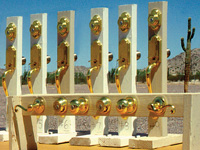
Door hardware manufacturers need to test their products for pitting and cracking of clear overcoats.
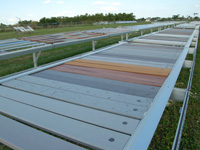
Orienting specimens horizontally (like this composite decking), increases time-of-wetness and best simulates actual service life.
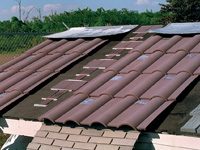
A variety of different roofing samples under test in Q-Lab Florida.
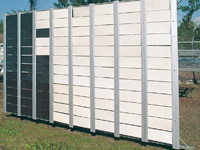
Specimens in 90 degree testing of siding are tested with a slight offset, to prevent rain runoff from the specimen above.
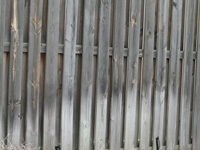
This fence illustrates the synergistic effects of water and sunlight, which can be simulated in an accelerated weathering tester.
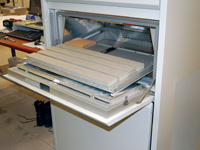
Specific test methods exist for how to test composite decking for color change in a xenon arc chamber.